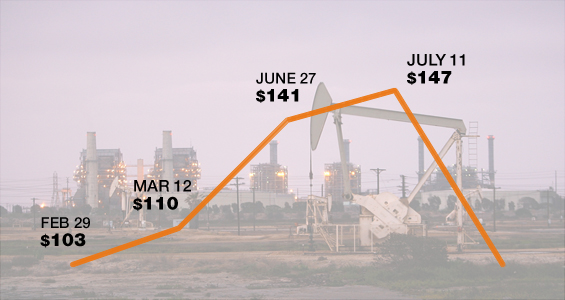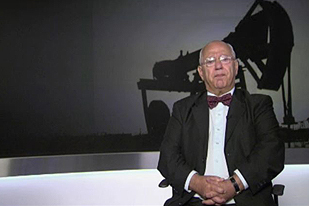Interview: Oil prices to rise again
As Opec meets in Vienna, an industry expert says the recent slump may not last.

 |
| Opec is meeting to discuss production amid concerns about price fluctuations. The price has fallen 30 per cent since a record high of $147 was reached on July 11 |
Opec oil ministers have decided to curb their collective output by more than 500,000 barrels a day and “strictly comply” with a quota target of 28.8 million barrels per day.
Mamdouh Salameh, an international oil economist and consultant to the World Bank on oil and energy, explains what factors are driving oil price fluctuations.
He predicts how world events might affect oil prices in future, and suggests some action governments can take to counter current trends.
 |
| Mamdouh Salameh says the Iraq war was a critical factor in high oil prices |
Al Jazeera: Oil prices have fallen to a five-month low after reaching a record high of $147.27 a barrel on July 11. Why did oil prices climb to record levels, and why have they suffered such a steep decline since then?
Salameh: The two biggest reasons for the high price of oil are “peak oil” and the invasion of Iraq.
Global conventional oil production, according to the peak oil theory, peaked in 2006 and has been in decline ever since. The US-led invasion of Iraq is the key reason for oil prices being as high as they are.
How has the US-led invasion of Iraq affected oil prices?
My research shows that if the war did not take place, and had the US allowed Iraq to begin its plan to develop its industry from the year 2000, Iraq would now be exporting five million barrels a day instead of just over one million barrels, thus off-setting the current widening deficit being global supplies and demand. Oil today would have been no higher than $50 a barrel.
There has been a lot of sabre-rattling between the US and Iraq’s neighbour, Iran. If this situation escalates, what impact could it have on oil prices?
If the US and Israel were to engage Iran militarily, I predict prices could reach $238 a barrel. This is because Iran might retaliate by closing or mining the Strait of Hormuz through which more than 20 million barrels of Gulf oil pass through daily.
What about oil production in Africa, kidnappings and attacks on pipelines in Nigeria, does this have a significant impact on oil prices?
Anything which affects global oil production can affect prices, such as these events that fall under the geopolitical category, when “freedom fighters” hit a pipeline either in Nigeria, or in Colombia where an Occidental pipeline was destroyed.
If the reduction is small it can be replaced by other producers, but if it is a major reduction, half a million barrels a day, then this affects prices. If these events happen in the Middle East, because their production is greater, the impact on prices is bigger.
So what role does Opec play when these geopolitical events impact oil prices?
In my view, Opec has lost the influence it once wielded in the 1970s when its decisions shook the world’s biggest economies. The reason is simply that Opec at present has virtually no extra production capacity with which to influence the oil price.
While some countries, such as the US, want output increased in order to alleviate the impact of oil high prices on their sluggish economies, others like Iran, Venezuela and Libya are pressing for output to be maintained or even decreased in order to maintain prices as their economies are benefiting from higher revenues. Who will prevail?
No producer wants the price to go down, but I do not think Iran and Venezuela will get their way. Saudi Arabia and Iraq and some other producers say $106 is an acceptable price.
What action can Opec take to address the problem of price fluctuations and the overall trend for rising oil prices?
Opec plans to increase capacity only gradually to avoid the price collapse of 1986. Moreover, my research shows Opec’s proven reserves are inflated by 300 billion barrels. The main reason oil prices have slipped back from a record high of $147 is that the slowdown in the US economy has dampened America’s demand for oil.
But this is only temporary. Oil prices may resume their upward trend possibly before the end of this year.
With John McCain, the Republican presidential candidate in the US picking Sarah Palin, the governor of Alaska, as his vice presidential running-mate, some of the reporting has been optimistic about future increased US production, because she is known to be sympathetic to exploration and drilling.
Will the US presidential election results make a difference?
Exploration in Alaska is an old story, so the impact on price is minimal. Even if they go ahead they cannot produce before 2012, and production would be about half a million barrels a day. Total US demand was, until recently, about 21 million barrels a day, of which 14 million was imported, so this would not have so much impact.
What is of more impact is the current US economic slowdown; this has reduced demand, in my estimation, by half a million barrels a day. The US economy has done a good job of reducing demand.
Given that oil is a finite resource, is there anything else that can be done to help keep oil prices at affordable levels?
Nearly 80 per cent of crude oil is used for transport. I urge the governments of the developed countries to legislate that all cars coming to the market from 2010 should make at least 80 miles a gallon rather than the current 30 miles a gallon. This is the most important step to bring oil prices down.